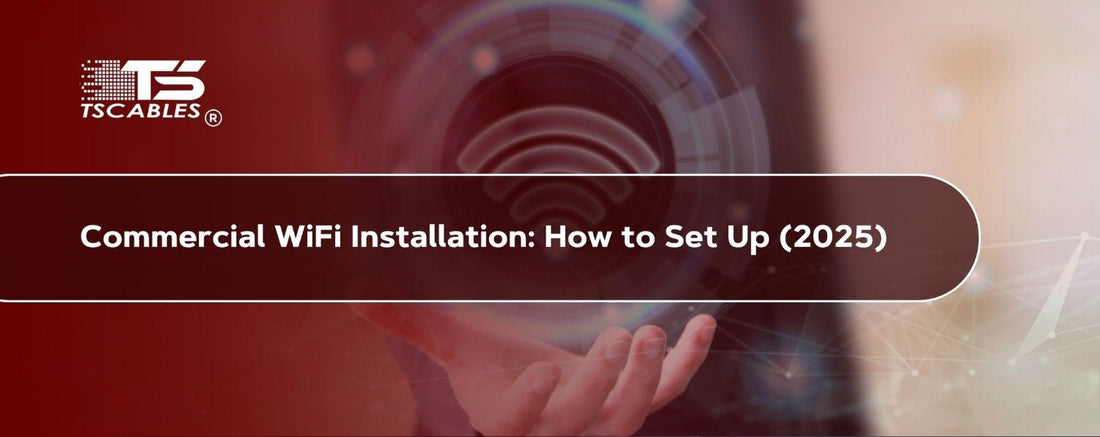Setting up a commercial WiFi installation in 2025 requires careful planning and the right tools. A reliable connection is the backbone of any business. Poor network coverage can slow productivity and frustrate customers. The right business Wi-Fi solutions will keep employees connected and customers satisfied.
So, how can you proceed with your Wi-Fi installation for commercial activities? This guide walks through practical steps to set up a Wi-Fi network that performs well and remains secure, without unnecessary complexity.
5 Wi-Fi Installation Steps for Commercial Needs
A solid Wi-Fi commercial setup starts with knowing your space and business demands. These steps explain the journey from initial assessment to a functioning business wireless network setup. Each stage is critical for long-term stability and reliable coverage. Let’s go over them in more detail.
Step 1 - Site Assessment & Planning
Before installing any equipment, assess your location to understand coverage needs. Identify potential dead zones and determine where to place each commercial access point for optimal performance.
Evaluate whether you need to extend the wireless internet range to outdoor areas. Plan cable routes for those who will hardwire Wi-Fi. A proper site survey ensures the network reaches all essential areas without gaps.
Step 2 - Select the Right Equipment
Choosing the right gear is vital. For high-traffic areas, business-grade Wi-Fi with multiple mesh Wi-Fi installers may be ideal. In offices, consider mesh Wi-Fi or commercial mesh Wi-Fi for a seamless signal.
Select routers with Ethernet in router ports for wired devices. The right equipment avoids signal dropouts and future upgrades. Your Wi-Fi installation company can guide you through the best options.
Step 3 - Professional Installation
Relying on experts ensures your professional Wi-Fi installation is done right the first time. Technicians know where to place routers and cabling to avoid interference. They can extend the Wi-Fi network coverage to warehouses or remote offices.
Hiring pros reduces downtime and prevents costly mistakes. If you search “commercial Wi-Fi installation near me,” choose a provider with proven experience in similar environments.
Step 4 - Security & Performance Configuration
Once the equipment is installed, fine-tune security and speed. Enable strong encryption and set up secure guest networks for Wi-Fi for retail customers. Limit bandwidth hogging by prioritizing essential business apps.
Adjust channel settings to avoid interference. A proper business Wi-Fi system should protect data and maintain peak speeds. This stage also includes testing the extension for Wi-Fi hardware.
Step 5 - Testing & Verification
The last step is confirming everything works as intended. Test coverage in every corner of your property, including where you extend internet access. Check speed at various times of the day.
Verify that your mesh network's Wi-Fi handoff devices smoothly between nodes. The goal is an extended Wi-Fi network that performs consistently and meets your business demands without weak spots.
What Is Wi-Fi Installation?
Wi-Fi installation is the process of setting up a wireless network so devices can connect to the internet without cables. In commercial spaces, it involves more than plugging in a router. It means:
- Planning where to place hardware for maximum coverage
- Deciding between options like a mesh Wi-Fi business or a single commercial access point
- Ensuring the system can handle many devices
The process may also include integrating wired connections for office Wi-Fi solutions that require high stability. Businesses often choose professional Wi-Fi installation to avoid mistakes and future headaches.
Proper installation impacts performance, security, and the ability to extend the reach of Wi-Fi when needed. For many, it is an investment in productivity, smooth operations, and customer satisfaction. A good setup will not just cover your needs today but also scale for future growth in your business's Wi-Fi system.
How Does Wireless Internet Work?
Wireless internet uses radio waves to transmit data between your device and the router. The router connects to the modem, which links to the internet through your provider. Wi-Fi in business setups means the process may involve multiple routers or commercial Wi-Fi repeater devices.
Signals travel across specific channels, and too much interference can reduce performance. Modern setups often use Wi-Fi mesh networking to ensure smooth handoffs between routers. This is essential in large spaces like warehouses or multi-floor offices. The range and strength of your signal depend on factors like:
- Router placement
- Building materials
- Use of a business Wi-Fi extender
Whether you are running a Wi-Fi installation for a business or a small shop, understanding this helps maintain stable and secure connections across the property.
Benefits of WiFi Installation
A reliable network keeps businesses connected, productive, and ready for growth. Commercial Wi-Fi installation allows smooth communication between staff and customers through well-connected devices. A well-planned setup also supports multiple connected gadgets without slowing performance.
From Wi-Fi for retail to warehouse Wi-Fi, having dependable coverage improves efficiency. It also helps extend access for visitors while keeping the core network secure. Businesses benefit from better scalability, easy upgrades, and modern connectivity that supports evolving operational needs.
How Long Does Wi-Fi Installation Take?
Installation time depends on network size, building structure, and hardware complexity. A small office may be up in a few hours. Large facilities with commercial Wi-Fi systems or mesh Wi-Fi setups might need one or two days. Professional Wi-Fi installation often includes cabling for hard-wired Wi-Fi connections, configuring devices, and testing coverage.
Delays can occur if there’s extra wiring, poor infrastructure, or specific Wi-Fi design services needed. Planning ahead ensures a smoother and faster process. Choosing an experienced Wi-Fi installation company makes the whole job more efficient.
How Much Does Wi-Fi Installation Cost?
Setting up a commercial network varies in cost due to hardware, labor, and coverage needs. Here’s a breakdown of key cost factors.
Wi-Fi Installation Price
How much Wi-Fi costs depends on the network scale and chosen equipment. A small office Wi-Fi setup might be a few hundred dollars, while a commercial mesh Wi-Fi system for large sites could run into thousands. Additional services like wireless Wi-Fi extension or business internet installation may add to the bill.
Wi-Fi Installation Equipment
Costs include routers, commercial Wi-Fi access points, switches, and cabling. High-performance gear like business-grade Wi-Fi routers or mesh Wi-Fi business systems raises the price but boosts reliability. Quality hardware ensures long-term stability and better security for Wi-Fi in business.
WiFi Installation Devices
Devices include business Wi-Fi extenders or wireless hub units. These help extend wireless internet range or improve weak spots. Adding an extension for Wi-Fi tools increases reach without replacing the whole network.
Wi-Fi Router Installation
This covers setting up routers with the right Ethernet in router connections. It includes configuration for setting up a wireless network and optimizing settings for speed, security, and multi-device handling.
Wi-Fi Extender Installation
Here, techs check if a Wi-Fi extender really works for the location. Proper placement helps extend the Wi-Fi network coverage effectively. This works well for both small offices and Wi-Fi for warehouse needs.
Wireless Network Installation
This step links all devices into one smooth system. It includes setting up a business wireless network and ensuring coverage meets demands. A complete wireless network installation may also involve advanced configurations for better management.
Mesh Wi-Fi Unifi Installation
Wi-Fi mesh-networking systems create an extended Wi-Fi network with seamless roaming. Mesh Wi-Fi installers position each node to cover dead zones. This keeps large spaces connected without drops, perfect for Wi-Fi installation for business and multi-floor buildings.
Where to Install Wi-Fi for Your Commercial Space?
Placement depends on coverage needs, interference risks, and the number of devices. It is important to choose the right location to ensure there are no interruptions. Here are some common scenarios.
WiFi Installation for Homes or SOHO (Small Office/Home Office)
Wi-Fi home service for SOHO (Small Office/Home Office) setups provide Wi-Fi in my home or Wi-Fi in the home with consistent speeds. Installers may extend the internet to different rooms or extend the reach of Wi-Fi for work areas.
WiFi Installation for Industrial Facility
Wi-Fi for construction sites or warehouses needs durable equipment. Commercial Wi-Fi repeaters and ultra-extended devices boost coverage across large areas. Warehouse Wi-Fi setups often mix business wireless network setups with wired links.
Choosing the Right Internet Service Provider, Router, and Equipment
Select a reliable ISP with good uptime. Pair it with high-quality routers, commercial mesh Wi-Fi, and business Wi-Fi system hardware. Equipment should match the Wi-Fi layout and usage patterns for the best results.
Maintenance Tips for Your Commercial Wi-Fi Installation
A stable network needs regular care. It is not a time thing and requires constant monitoring and upkeep. However, there is no rocket science that goes into this process. All you have to do is follow these tips to avoid downtime:
- Restart routers and extenders regularly to keep them fresh
- Keep firmware updated for security and performance
- Test signal strength to spot weak areas early
- Replace outdated gear before it starts slowing things down
- Use secure passwords to protect the network
Takeaway
A smart commercial Wi-Fi installation boosts business productivity, customer satisfaction, and long-term reliability. Investing in a professionally installed system will help you gain more than just fast internet. It will ensure you get consistent performance for secure connections with scalability for future growth.
Whether it’s Wi-Fi for warehouse environments, retail spaces, or corporate offices, a tailored solution eliminates coverage gaps and optimizes workflow. TS Cables offers expert planning, equipment, and support for every project.
From the initial consultation to on-site setup and ongoing maintenance, a trusted partner like TS Cables ensures your network remains strong, stable, and ready to meet the demands of your business every day. Contact TS Cables today for dependable connectivity that works as hard as you do.
FAQs
1. How much does commercial WiFi installation typically cost?
The cost depends on the size of the property, the number of devices, and the type of equipment used. Smaller setups may cost a few hundred dollars, while larger mesh Wi-Fi business networks can reach several thousand.
2. How long does it take to install WiFi in a business?
Most small offices can be set up within a few hours, while large facilities with complex layouts may take one to two days for complete wireless network installation.
3. Can WiFi coverage be extended to multiple buildings?
Yes. Business Wi-Fi extenders, commercial access points, and mesh Wi-Fi systems can be installed to ensure coverage across multiple structures without performance drops.
4. What’s the difference between a router and a WiFi extender?
A router connects devices to the internet, while an extender helps extend Wi-Fi network coverage to areas where the signal is weak or blocked.
5. Do I need professional installation, or can I do it myself?
While small home setups can be DIY, professional Wi-Fi installation ensures optimal placement, security configuration, and reliable coverage for business or large-scale needs.






